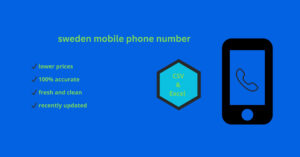Apply dynamic segmentation
Posted: Sat Dec 07, 2024 6:28 am
Geographic location.
Online behavior.
This division allows you to send more relevant messages and increases the probability of generating positive responses.
2.
Behavior-based personalization: adapt emails based on users' previous interactions.
Improvement of key metrics: align content with the recipient's interests to increase open and conversion rates.
3. Identify roles within companies
Tailor content to each role: Recognize recipients' titles and functions to offer specific solutions to their challenges.
4. Implement effective recruitment strategies
lead magnets and relevant content: use sweden mobile phone number resources such as guides, reports or discounts to attract prospects and register them in your database.

Lead nurturing: nourishes the relationship through segmented, personalized and continuous campaigns, ensuring long-term commitment.
Content adapted to specific needs
Audience segmentation in b2b email marketing is crucial to sending messages that resonate with each group of contacts. Content should be valuable and useful to the recipient, with a focus on educating prospects and customers through guides, case studies, and informative articles.
Marketing automation tools facilitate this personalization, since they make it possible to send emails adapted to predefined conditions and stages of the sales cycle of each potential client. These tools ensure that content is always relevant and aligned with the recipient's purchasing process.
Impact of automation on campaigns
Email marketing automation transforms the traditional approach to B2B campaigns. Save time and reduce costs, freeing teams from tedious tasks. Automation platforms allow you to manage email, social media and advertising campaigns from a single place. This improves the overall efficiency of marketing strategies. Plus, with automation, contacts are automatically tagged based on their actions. This facilitates audience segmentation, allowing for more targeted and effective messages.
With automated systems, companies follow actions not taken by contacts. This helps fine-tune campaigns to increase conversion rate.
Benefits of automated workflows
Automated workflows create personalized campaigns, increasing the relevance of messages sent to subscribers. Automation effectively segments audiences, based on user behaviors and characteristics. Emails are sent at the most appropriate time, thus improving open and conversion rates. These tools optimize message delivery, helping to avoid blacklists and overcome spam filters.
Automation makes it easy to collect data for campaign performance analysis. This allows adjustments to be made for future strategies, thus maximizing their effectiveness. Automated workflows become the cornerstone of any modern digital marketing strategy.
"mail delivered" - a hieroglyph for a person sent to earth. Illustrated by dall·e 3.
The use of artificial intelligence in email marketing
Artificial intelligence (AI) will be a large part of the B2B email marketing strategy by 2025. It analyzes large volumes of data, identifies patterns and predicts user behavior.
Online behavior.
This division allows you to send more relevant messages and increases the probability of generating positive responses.
2.
Behavior-based personalization: adapt emails based on users' previous interactions.
Improvement of key metrics: align content with the recipient's interests to increase open and conversion rates.
3. Identify roles within companies
Tailor content to each role: Recognize recipients' titles and functions to offer specific solutions to their challenges.
4. Implement effective recruitment strategies
lead magnets and relevant content: use sweden mobile phone number resources such as guides, reports or discounts to attract prospects and register them in your database.

Lead nurturing: nourishes the relationship through segmented, personalized and continuous campaigns, ensuring long-term commitment.
Content adapted to specific needs
Audience segmentation in b2b email marketing is crucial to sending messages that resonate with each group of contacts. Content should be valuable and useful to the recipient, with a focus on educating prospects and customers through guides, case studies, and informative articles.
Marketing automation tools facilitate this personalization, since they make it possible to send emails adapted to predefined conditions and stages of the sales cycle of each potential client. These tools ensure that content is always relevant and aligned with the recipient's purchasing process.
Impact of automation on campaigns
Email marketing automation transforms the traditional approach to B2B campaigns. Save time and reduce costs, freeing teams from tedious tasks. Automation platforms allow you to manage email, social media and advertising campaigns from a single place. This improves the overall efficiency of marketing strategies. Plus, with automation, contacts are automatically tagged based on their actions. This facilitates audience segmentation, allowing for more targeted and effective messages.
With automated systems, companies follow actions not taken by contacts. This helps fine-tune campaigns to increase conversion rate.
Benefits of automated workflows
Automated workflows create personalized campaigns, increasing the relevance of messages sent to subscribers. Automation effectively segments audiences, based on user behaviors and characteristics. Emails are sent at the most appropriate time, thus improving open and conversion rates. These tools optimize message delivery, helping to avoid blacklists and overcome spam filters.
Automation makes it easy to collect data for campaign performance analysis. This allows adjustments to be made for future strategies, thus maximizing their effectiveness. Automated workflows become the cornerstone of any modern digital marketing strategy.
"mail delivered" - a hieroglyph for a person sent to earth. Illustrated by dall·e 3.
The use of artificial intelligence in email marketing
Artificial intelligence (AI) will be a large part of the B2B email marketing strategy by 2025. It analyzes large volumes of data, identifies patterns and predicts user behavior.